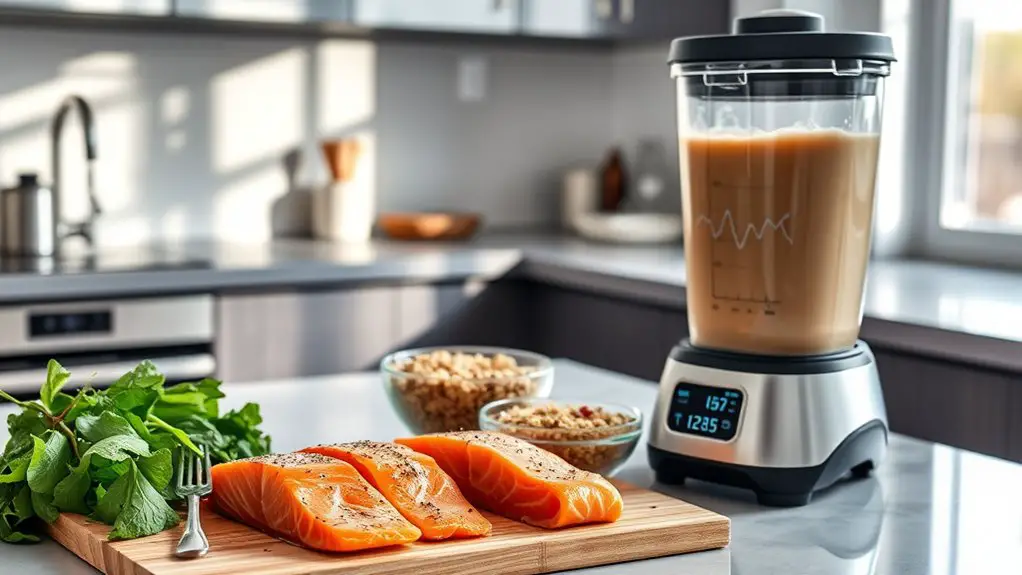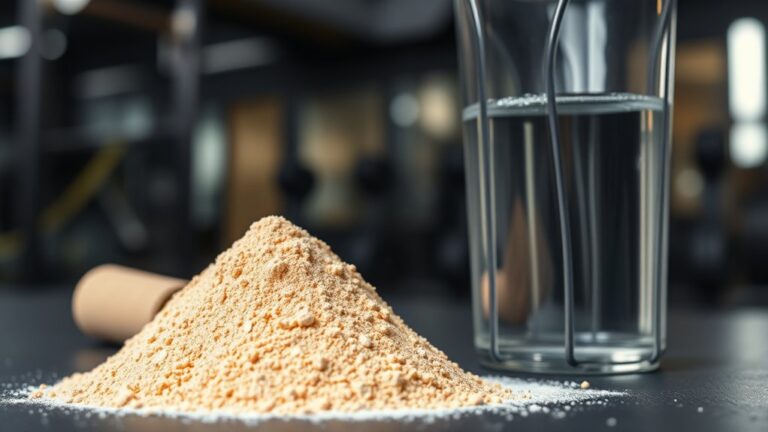How to Build Muscle With a High-Protein Diet

To build muscle effectively with a high-protein diet, focus on consuming complete protein sources like chicken, fish, and eggs, or combine plant proteins for a complete amino acid profile. Timing matters; aim to eat protein 30-60 minutes before and after workouts. Balancing your protein intake with carbohydrates and healthy fats is also key for energy and hormone production. Monitoring your intake and adjusting as needed will help optimize muscle growth. There’s more to discover about maximizing your results.
Understanding Protein and Its Role in Muscle Building

Protein is an essential macronutrient for anyone looking to build muscle effectively. It plays a critical role in protein synthesis, the process where your body uses amino acids to create new proteins necessary for muscle growth. When you engage in resistance training, muscle fibers undergo stress and micro-tears, which need repair. Adequate protein intake is key for muscle repair, allowing your body to recover and strengthen those fibers.
Research suggests that consuming protein shortly after your workout can optimize muscle recovery and enhance protein synthesis. The timing and quality of protein matter; aim for complete proteins that contain all essential amino acids. By understanding protein’s role in muscle repair and growth, you can tailor your diet to support your fitness goals. Remember, it’s not just about high protein intake—it’s about understanding how it functions in your body to promote effective muscle building.
Top Sources of Protein for Muscle Growth
When looking to build muscle effectively, incorporating a variety of protein sources into your diet is crucial. Animal proteins, such as chicken, beef, fish, and eggs, are complete proteins, meaning they contain all the essential amino acids your body needs for muscle repair and growth. These sources are particularly beneficial post-workout to maximize recovery.
On the other hand, plant proteins, including lentils, chickpeas, quinoa, and tofu, offer great options for those following a vegetarian or vegan diet. While they may lack one or more essential amino acids, combining different plant sources can help you achieve a complete amino acid profile.
Incorporating both animal and plant proteins into your meals can enhance your overall protein intake, fostering better muscle growth. Aim for a balanced approach to guarantee your body gets the nutrients it needs to thrive.
How to Incorporate Protein Into Your Daily Meals

How can you seamlessly integrate protein into your daily meals? Start with meal prep. By planning your week, you can guarantee each meal contains a good source of protein. For breakfast, consider adding Greek yogurt or eggs to your routine. At lunch, opt for grilled chicken or quinoa salads packed with beans.
Snacking is another great opportunity to boost your protein intake. Instead of reaching for chips, try protein snacks like cottage cheese with fruit or nut butter on whole-grain toast.
Snacking smartly can elevate your protein intake; swap chips for cottage cheese with fruit or nut butter on whole-grain toast.
Don’t forget about dinner; incorporate fish, lean meats, or plant-based proteins into your meals.
Using spices and marinades can enhance flavors, making these protein-rich foods even more enjoyable. With a bit of planning and creativity in meal prep, you can easily meet your protein goals while keeping your meals satisfying and delicious.
The Importance of Timing: When to Consume Protein
Timing your protein intake can greatly impact your muscle-building efforts. Consuming protein before and after your workouts, along with distributing it evenly throughout the day, helps optimize recovery and promote muscle synthesis. Understanding when to fuel your body with protein is essential for maximizing your results.
Pre-Workout Protein Intake
Although many people focus on protein intake after workouts, pre-workout nutrition is equally vital for maximizing muscle growth and performance. Consuming protein before exercising can enhance your energy levels and support muscle repair during your workout. Aim to eat a balanced meal or a pre-workout snack containing protein 30 to 60 minutes prior to your training session. This timing allows your body to utilize amino acids effectively, promoting muscle protein synthesis. Ideal sources include Greek yogurt, a protein shake, or a small serving of chicken with complex carbohydrates. Remember, protein timing is essential; the right pre-workout nutrition prepares your muscles for the stress of exercise, ultimately leading to better gains and improved performance in the long run.
Post-Workout Recovery Nutrition
As you wrap up your workout, the importance of post-workout nutrition can’t be overstated, especially when it comes to protein consumption. To optimize muscle recovery, aim to consume protein within 30 to 60 minutes after exercising. This period is essential for nutrient timing, as your muscles are primed to absorb nutrients effectively.
Incorporating high-quality protein sources, like whey or lean meats, enhances recovery strategies by promoting muscle repair and growth. Research suggests that consuming 20 to 30 grams of protein post-exercise accelerates recovery and reduces muscle soreness. Additionally, pairing protein with carbohydrates can further enhance glycogen replenishment, ensuring you’re ready for your next training session. Prioritizing post-workout nutrition sets the foundation for continued progress in your muscle-building journey.
Daily Protein Distribution
For ideal muscle growth and recovery, distributing your protein intake throughout the day is essential. Research shows that meal frequency plays a significant role in maximizing muscle protein synthesis. Aim to consume protein-rich meals every 3 to 4 hours, which helps maintain a steady supply of amino acids for muscle repair and growth. Additionally, focusing on protein quality is vital; prioritize sources like lean meats, dairy, and legumes that provide all essential amino acids. By timing your protein intake effectively and ensuring you’re consuming high-quality options, you can optimize your muscle-building potential. Remember, it’s not just about the total protein consumed, but how you distribute it to support your body’s needs throughout the day.
Balancing Protein With Other Nutrients
While prioritizing protein is essential for muscle growth, it’s equally important to balance it with other nutrients to support overall health and performance. Carbohydrates play a significant role in replenishing glycogen stores, which are critical for fueling your workouts. Achieving a carbohydrate balance in your diet can enhance your energy levels and improve recovery. Aim to include complex carbohydrates like whole grains, fruits, and vegetables to provide sustained energy while supporting muscle synthesis.
Additionally, don’t overlook fat inclusion in your diet. Healthy fats, such as those found in avocados, nuts, and olive oil, are important for hormone production and overall cellular function. A balanced intake of protein, carbohydrates, and fats can enhance nutrient absorption and optimize your body’s performance. By ensuring you meet your requirements for all macronutrients, you’ll not only promote muscle growth but also maintain good health and well-being.
Monitoring Your Progress and Adjusting Your Intake

How can you effectively track your muscle-building progress and adjust your protein intake accordingly? Monitoring your progress is essential for ensuring your diet aligns with your fitness goals. Use a combination of body measurements, strength assessments, and nutritional logs to evaluate your advancements. If you notice stagnation, it may be time for adjusting intake.
Here’s a simple way to track your progress:
| Measurement | Frequency |
|---|---|
| Body Weight | Weekly |
| Strength Levels | Bi-weekly |
| Protein Intake | Daily |
Frequently Asked Questions
How Much Protein Do I Need Daily for Muscle Gain?
To determine how much protein you need daily for muscle gain, aim for about 1.6 to 2.2 grams of protein per kilogram of body weight. Focus on high-quality protein sources like chicken, fish, and legumes. Additionally, consider protein timing; consuming protein-rich meals spread throughout the day, especially post-workout, optimizes muscle repair and growth. This approach, combined with a balanced diet, can greatly enhance your muscle-building efforts.
Can I Build Muscle on a Vegetarian or Vegan Diet?
Absolutely, you can build muscle on a vegetarian or vegan diet! Think of plant-based proteins as the sturdy roots of a tree, nourishing your growth. By incorporating legumes, quinoa, and nuts, you’ll guarantee you’re getting the essential amino acids needed for muscle recovery. Studies show that with proper planning, a vegetarian or vegan diet can meet your protein needs effectively, promoting muscle gain just as well as animal-based diets.
Is Protein Powder Necessary for Muscle Growth?
Protein powder isn’t strictly necessary for muscle growth. You can absolutely meet your protein needs through whole food sources like chicken, beans, and tofu. However, if you struggle to consume enough protein or need a convenient option post-workout, protein powder can be a helpful supplement alternative. Just make certain you’re still focusing on a balanced diet and varying your protein sources to guarantee you’re getting all essential amino acids for peak muscle development.
What Are the Side Effects of Consuming Too Much Protein?
Did you know that consuming more than 2 grams of protein per kilogram of body weight can lead to potential health risks? If you’re overdoing it, you might face protein toxicity, which can cause kidney strain, especially if you have pre-existing conditions. Excess protein can also lead to dehydration and digestive issues. It’s crucial to balance your intake to avoid these side effects while still meeting your nutritional needs for muscle growth.
How Does Hydration Affect Protein’s Effectiveness in Muscle Building?
Hydration levels play an essential role in muscle recovery and protein effectiveness. When you’re well-hydrated, your body can efficiently transport nutrients, including amino acids from protein, to muscle cells. Dehydration can hinder muscle repair and growth, leading to fatigue and decreased performance. To maximize your protein intake’s benefits, make certain you drink enough water daily. Staying hydrated not only supports muscle recovery but also optimizes your overall workout performance and health.





